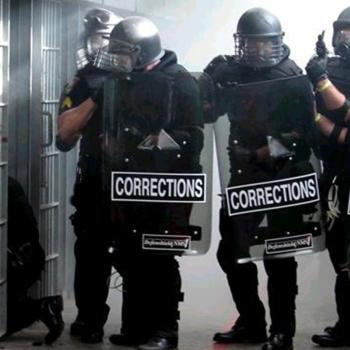Yesterday’s post on the subject hardly exhausted all the practical reasons against using torture on terror suspects (to cite but one omission, torturing a suspect will likely mean that he can never be brought to trial and forced to answer for what he has done). However, the post was, I think, sufficient to show that torture “does not work” and should not be used or condoned or winked at by the United States. Nevertheless, there is one other consideration which I would like to highlight, a consideration that, to use a mixed metaphor, tips the scales against the use of torture beyond all reasonable doubt. That consideration is this. The War on Terror is not only a battle fo bombs and bullets, it is a battle of ideas. By engaging in torture, by defending it, legitimizing it, codifying it in our law, we cede a portion of the moral high ground in that battle, which is worth more to us in practical terms than several Army divisions. Our use of torture makes people who are inclined to love this country love us less and those who are inclined to hate us hate us more. When we condemn human rights abuses in other countries our condemnation will have less credibility. When Europeans and Leftists attack American policy, those attacks will have more credibility. And when American solders fall into enemy hands, they will be more likely to be mistreated.
There are some people, who call themselves realists (though in my experience they can be quite naive) who scorn this sort of argument. According to these fellows the only thing that matters in the international arena is hard power. People will hate us, and liberals will preen, and bad men will do wicked deeds regardless of how we conduct ourselves. There is some truth in this, but as with many things said by these so-called realists, there is not enough. It is true that no matter what we do there will be people who hate us. What is not true is that no matter what we do there will be just as many. There are people who used to be flag waving patriots who now question the whole idea of the war on terror and speak grimly of a political state, largely because of the issue of torture. I know some of them. There are people struggling in foreign lands against tyrants who look to the United States as an example and ideal who have been despised and demoralized by our actions. And yes, strange as it may sound, there are people out there who hate us because of what we have done to their co-religionists. The idea that torture won’t breed resentment in a culture that nurses grievance for centuries is a bit baffling.
Bad men will do bad things and liberals will preen no matter what we do, but even bad men need to be able to appear good to a certain degree and some liberal attacks will have more resonance than others. History provides hundreds of examples of this. The Soviet invasion of Hungary The British left was demoralized after the Soviets invaded Hungary. It was rejuvenated when the British invaded Egypt. Amnesty International’s letter writing campaigns have helped free more than 40,000 political prisoners over the last 40 years, not because the dictators who received many of these letters suddenly had a change of heart and became saints, but because they didn’t want to look bad. Success in Iraq, to the extent that it’s even possible, can only come if the Iraqis don’t believe that we are a malevolent and imperial interloper in their affairs.
If moral symbolism doesn’t matter, then it should be no problem if we were to hang a Nazi flag in the Oval Office. If power rules in foreign affairs, then the fact that we displayed such a flag should have little to no effect on our ability to be effective internationally. I take it as obvious that the reality would be somewhat different.
Right or wrong, a great many people see legitimizing torture as the equivalent of flying a Nazi flag. It brings us down to the level of our enemies and seriously undercuts our ability to inspire high ideals in others. Such tactics could only be justified, if at all, if they produced some enormous military benefit to counter-balance these ills, and as I have tried to show, no such benefit exists. We ought, therefore, to oppose our government’s use of torture as if our very way of life depended on it, because in the end it might.
















